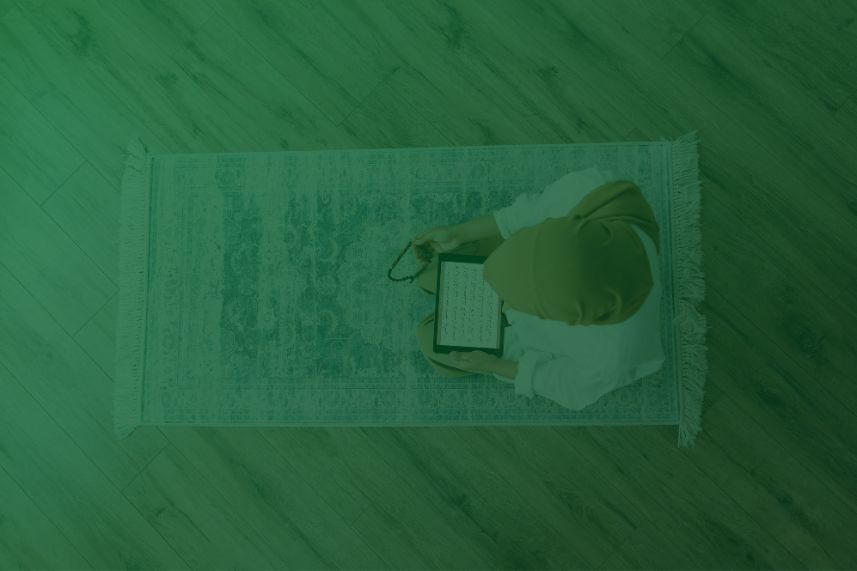The practices after the Fajr prayer have many virtues, because the Fajr prayer time has a privilege of other fardhu prayers. Its privilege has been Allah SWT says in the Quran, “Keep up the prayers at the sinking of the sun to the dusk of the night and (the reading) of the Qur’an at dawn; surely the reading of the Qur’an at dawn has been witnessed.)” (QS. Al-Isra’: 78)
Angels watch people who perform the Fajr prayer right on time. They will always pray, and pray for all the duas of Allah’s righteous servants. There are several practices after the Fajr prayer (the Subuh prayer) that are recommended to be done. Practices that can perfect the reward of the Fajr prayer and expand sustenance. Check this out!
1. Reciting Dhikr and Salawat as A Practice After the Fajr Prayer
The first practice is to recite dhikr to Allah SWT and recite salawat to the Prophet Muhammad (peace be upon him). In a narration explained that, the Prophet always recited dhikr in the morning and evening three times. The dhikr that the Prophet (peace be upon him) recited was prayed by 70,000 angels who asked Allah SWT for forgiveness.
Also Read: Sederet Keutamaan Membaca Alquran Setiap Hari: Sembuh dari Sakit hingga Panen Nikmat
The following are dhikr prayers that can be practiced according to the teachings of the Prophet SAW:
أَعُوذُ بِاللَّهِ السَّمِيعِ الْعَلِيمِ مِنَ الشَّيْطَانِ الرَّجِيمِ
‘Auzdubillahis samii’il ‘aliimi minasy syaithoonir rojiimi.
It means, “I take refuge in the All-Hearing and All-Knowing God from the cursed temptations of Satan.” This prayer is recited three times, and the following dhikr prayer:
لَا إِلَهَ إِلَّا اللَّهُ وَحْدَهُ لَا شَرِيكَ لَهُ, لَهُ الْمُلْكُ وَلَهُ الْحَمْدُ, يحيي ويميت, وَهُوَ عَلَى كُلِّ شَيْءٍ قَدِيرٌ
Laa ilaha illallahu wahdahu laa Syarika lah, Lahul Mulku wa Lahul hamdu, Yuhyii wa Yumiitu, wa Huwa ‘ala Kulli Syai-in Qodiir.
It means, “There is no God but Allah the Greatness, no ally to Him. To Him are all kingdoms and all praises. It is Him who animates and deadens, and He is the Almighty over all things.” This dhikr prayer is recited 10 times. Next, read the salawat for the Prophet:
اَللَّهُمَّ صَلِّ عَلىَ مُحَمَّدٍ وَعَلىَ آلِ مُحَمَّدٍ
“Allahumma sholli ‘ala Muhammad wa ‘ala ali Muhammad.”
It means, “O Allah, grant Your mercy to our Prophet Muhammad and the family of Prophet Muhammad.”
As for the virtue of reciting the salawat for the Prophet Muhammad (PBUH) described in a hadith narration, from Abu Huraira Ra, he heard the Prophet (PBUH) say, “Whoever sends blessings upon me once, Allah sends blessings upon him ten times.” (Sahih al-Tirmidhi)
Also Read: Hidup Sehat dengan Jalankan 5 Amalan Sunnah Rasulullah SAW
2. Reciting the Last Three Verses of Surah Al Hashr
The next practice after the Fajr prayer that can be applied is to recite the last three verses of Surah Al Hashr. Here are the last three verses of Surah Al Hashr that Muslims need to memorize:
هُوَ اللّٰهُ الَّذِيْ لَآ اِلٰهَ اِلَّا هُوَۚ عَالِمُ الْغَيْبِ وَالشَّهَادَةِۚ هُوَ الرَّحْمٰنُ الرَّحِيْمُ هُوَ اللّٰهُ الَّذِيْ لَآ اِلٰهَ اِلَّا هُوَ ۚ اَلْمَلِكُ الْقُدُّوْسُ السَّلٰمُ الْمُؤْمِنُ الْمُهَيْمِنُ الْعَزِيْزُ الْجَبَّارُ الْمُتَكَبِّرُۗ سُبْحٰنَ اللّٰهِ عَمَّا يُشْرِكُوْنَ هُوَ اللّٰهُ الْخَالِقُ الْبَارِئُ الْمُصَوِّرُ لَهُ الْاَسْمَاۤءُ الْحُسْنٰىۗ يُسَبِّحُ لَهٗ مَا فِى السَّمٰوٰتِ وَالْاَرْضِۚ وَهُوَ الْعَزِيْزُ الْحَكِيْمُ
“Huwa allaahu alladzii laa ilaaha illaa huwa ‘aalimu alghaybi waalsysyahaadati huwa alrrahmaanu alrrahiimu. Huwa allaahu alladzii laa ilaaha illaa huwa almaliku alqudduusu alssalaamu almu/minu almuhayminu al’aziizu aljabbaaru almutakabbiru subhaana allaahi ‘ammaa yusyrikuuna.
Huwa allaahu alkhaaliqu albaari-u almushawwiru lahu al-asmaau alhusnaa yusabbihu lahu maa fii alssamaawaati waal-ardhi wahuwa al’aziizu alhakiimu.”
Meaning: “He is Allah—there is no god (worthy of worship) except Him: Knower of the seen and unseen. He is the Most Compassionate, Most Merciful. He is Allah—there is no god (worthy of worship) except Him: the King, the Most Holy, the All-Perfect, the Source of Serenity, the Watcher (of all), the Almighty, the Supreme in Might, the Majestic. Glorified is Allah far above what they associate with Him.
He is Allah: the Creator, the Inventor, the Shaper. He (alone) has the Most Beautiful Names. Whatever is in the heavens and the earth (constantly) glorifies Him. And He is the Almighty, All-Wise.” (QS. Al Hashr: 22-24)
The Virtue of Reciting the Last Three Verses as a Practice After the Fajr Prayer
The virtue of reciting the last three verses is mentioned in the hadith narrated by Imam Tirmidhi that, “Whoever says three times when he gets up in the morning: ‘A’udhu Billahis-Sami Al-‘Alim Min Ash-Shaitanir-Rajim’ (I take refuge in the All-Hearing and All-Knowing God from the cursed temptations of Satan) and he recites the last three verses of Surah Al-Hashr – Allah appoints seventy-thousand angels who ask for forgiveness upon him until the evening. If he dies on that day, he dies a shaheed, and whoever reaches the evening, he holds the same status.” (Sahih al-Tirmidhi)
Also Read: 7 Keutamaan Shalat Dhuha Bagi Seorang Muslim
3. Ishraq Prayer or Dhuha Prayer
The next practice after the Fajr prayer is to do the Ishraq prayer or dhuha prayer. The advice to carry out this practice is mentioned in the book ‘Riyadhus Shalihin’ that:
وَعَنْ جَابِرٍ بْنِ سَمُرَةَ – رَضِيَ اللهُ عَنْهُ – ، قَالَ : كَانَ النبيُّ – صَلَّى اللهُ عَلَيْهِ وَسَلَّمَ – إِذَا صَلَّى الفَجْرَ تَرَبَّعَ في مَجْلِسِهِ حَتَّى تَطْلُعَ الشَّمْسُ حَسْنَاء . حَدِيْثٌ صَحِيْحٌ ، رَوَاهُ أَبُوْ دَاوُدَ وَغَيْرُهُ بِأَسَانِيْدَ صَحِيْحَةٍ
“From Jabir ibn Samurah radhiyallahu ‘anhuma, he said: ‘The Prophet (peace and blessings of Allah be upon him) when he performed the Fajr prayer, he sat cross-legged in his seat until the rising of the sun whose light is beautiful white’.” (HR. Abu Dawud and other shahih) (HR Muslim No. 4851; Abu Dawud No. 4850)
This practice after the Fajr prayer is highly recommended because it has many virtues, one of which is mentioned in the following hadith:
From Abu Umamah radhiyallahu ‘anhu, the Prophet (peace and blessings of Allah be upon him) said, “Whoever performs the Fajr prayer in congregation in the mosque, then he remains in the mosque until performing the Sunnah Dhuha prayer (subhah adh-dhuha), then he is like getting the reward of one who performs Hajj or Umrah perfectly.” (HR Thabrani in Al-Mu’jam Al-Kabir, 8:174, 181, 209. Sheikh Al-Albani in Shahih At-Targhib wa At-Tarhib, 1:189 says that this hadith is hasan)
4. A Practice of Fajr Almsgiving
Bersedekah di waktu subuh (almsgiving at Fajr time) is a recommendation that the Prophet taught, because it has the virtue of being witnessed and prayed for by two angels to be given in exchange for the property that has been donated. As explained in the following hadith:
It is from Abu Huraira radhiyallahu ‘anhu, that the Prophet (peace and blessings of Allah be upon him) said: “There is not a day when a servant passes by his morning except to come down (come) two angels to him and one of them says; ” O Allah, give an exchange for whoever donates his property”, while the other said; “O Allah, grant destruction to those who hold their property (bakhil).” (Sahih al-Bukhari) [No. 1442 Fathul Bari] Shahih.
Also Read: 5 Hal Ini Bisa Bikin Pahala Sedekah Hilang, Apa Saja?
The Fajr time is very short. Do not let the practice of dawn almsgiving be missed. Carry out the practice of dawn almsgiving quickly and safely through Dompet Dhuafa. Click the following link for more information.




